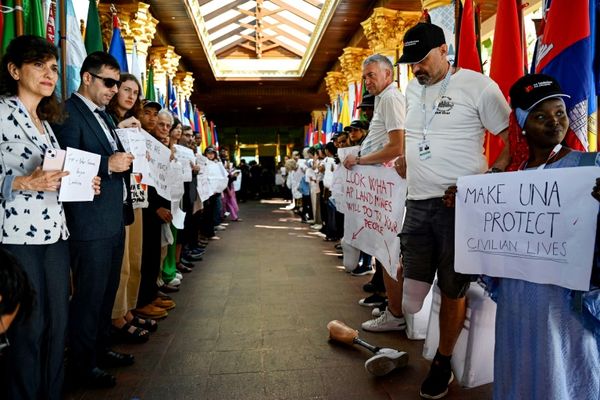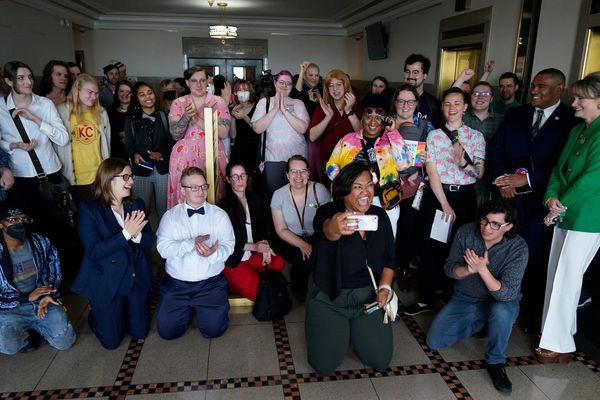SACRAMENTO, Calif. _ California's most powerful labor unions will defer to their national leadership in deciding any 2020 presidential endorsement. But that doesn't mean the state's workers won't have a say.
From the Services Employees International Union to the National Education Association, Californians hold key positions on the decision-making bodies that will determine if, and whom, their union endorses in the presidential primary next year. As of now, their allegiances are split.
Home state Sen. Kamala Harris has been courting many of those local union members and has some high-ranking former California labor leaders on her staff, including senior advisers Laphonza Butler, who until recently was president of the largest union California, SEIU Local 2015, which represents homecare workers.
But local workers, labor leaders and some political advisers say Harris can't count on California's votes when it comes time for a national endorsement decision.
"I do think that Kamala Harris has been a friend of labor here in California," says Kent Wong, director of the UCLA Labor Center and a vice president of the California Federation of Teachers. "But I don't think ... she has wrapped up labor support in California. There are many union members who still support Bernie Sanders. There are many that support Elizabeth Warren. Some support Joe Biden."
The huge Democratic field of presidential candidates in 2020 and the fragmentation of labor support between those candidates has raised the possibility, union organizers say, that many of the country's most powerful unions will stay on the sidelines until late in the primary _ or not endorse at all until the general election.
If some do decide to line up behind one candidate early on, it could be a significant boost in California, which is home to 2.4 million union members, more than any other state. Unions are also a factor in early voting states like Iowa and Nevada, which have active labor movements with a history of turning out their voters.
Most of the international unions have executive boards or councils that vote on presidential endorsements. California is well-represented on many of those, particularly unions that represent large numbers of public sector workers like the SEIU, the NEA, National Nurses United and the American Federation of State, County and Municipal Employees.
The NEA, for example, has a PAC Council that is comprised of representatives from every state, NEA caucus and executive committee, which recommends a presidential primary endorsement to its executive board.
Two California teachers are on the six-person executive committee, including one from El Dorado County.
The California Teachers Association, a member of the NEA that represents more than 300,000 educators, will follow the endorsement decision made by that national council, a spokeswoman confirmed.
Harris has sought to woo teachers, rolling out a proposal early in her campaign to increase teacher pay by an average of $13,500.
"I love Kamala Harris," former California Teachers Association President Eric Heins told McClatchy. Heins credited Harris for defending workers and public school teachers, in particular, as California attorney general, including suing one for-profit charter school operator accused of fraud. "It takes courage to do stuff like that and she won," he said.
But Heins also acknowledged that "there are a lot of teachers that support Bernie, and other candidates, as well."
That's true across other labor sectors. Stephanie Roberson, government relations director for the California Nurses Association, an affiliate of NNU, said nurses planned to "judge each candidate on the issues" when weighing an endorsement. Top on the list: Medicare for All.
"We believe fundamentally that private insurance has no role in health care," said Roberson, which would seem to eliminate Harris from contention, given that her Medicare-for-All proposal would allow private insurers to participate.
NNU endorsed Sanders in the 2016 primary. About half of its PAC council is from California.
Among the handful of people introducing Sanders at his rally in Sacramento last week was Joaquin Chavez, vice president of CWA 9119, which represents more than 10,000 technical and professional employees of the University of California system.
"We asked every presidential contender at the time, 'will you stand with us?'" as they were negotiating a new contract over the past two years, Chavez told the crowd gathered in the capital city. "You know who answered that call? Senator Bernie Sanders! And he didn't just show up, he brought an army of supporters with him."
Unions took heat in 2016 for lining up early behind Hillary Clinton in the Democratic primary, despite many workers' support of Sanders. So this year, labor leaders are promising more consultation with their members in 2020. And they are pushing the herd of Democrats seeking a presidential endorsement to engage with rank-and-file workers much more than in the past.
"They need to show up," said Sara Nelson, president of the International Association of Flight Attendants-CWA. "Engage in one of our events."
Sanders isn't the only one heeding that advice. Former Housing and Urban Julian Castro joined a picket line to support University of California workers at Mission Bay Medical Center in San Francisco in May.
On Tuesday, South Bend, Ind. Mayor Pete Buttigieg appeared at a protest in front of Uber's San Francisco headquarters, speaking to drivers with the car share platform who were calling for the passage of state legislation to categorize many so-called "gig economy" workers, like them, as employees eligible for benefits and protections.
"Where I come from, gig is another word for job _ which means if you're working a gig, that makes you a worker, and you ought to be protected as a worker," Buttigieg told the drivers.
Warren, the Massachusetts senator, supported the Assembly bill, known as AB 5, in a Sacramento Bee op-ed earlier this month. Harris and Sanders have also voiced support for the legislation.
Harris also marched with McDonald's workers demanding a $15 minimum wage in Las Vegas in June and "walked a day in the shoes" of Detroit security guard Delores McDaniel at the beginning of August, part of an SEIU program that encourages candidates "to experience firsthand what it's like to work and raise a family in America."
Those kinds of events are an opportunity, Nelson said, for the presidential candidates "to be a part of something that can get results now."
"If they want to prove they are a politician who can get things done," added Nelson, "then get on a union picket line."







